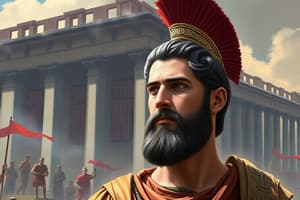Podcast
Questions and Answers
The setting of the play is:
The setting of the play is:
- Ancient Britain.
- modern day Rome.
- Ancient Rome. (correct)
- modern day Europe.
Marullus (one of the tribunes) believes the commoners celebrating in the streets:
Marullus (one of the tribunes) believes the commoners celebrating in the streets:
- are hypocrites because they once celebrated for Pompey.
- are ungrateful for what their former ruler did for them.
- should go home and not celebrate again.
- All of the above (correct)
Caesar's response to the soothsayer's warning indicates what about his character?
Caesar's response to the soothsayer's warning indicates what about his character?
- He is both superstitious and fearful
- He is neither superstitious nor fearful (correct)
- He is both rude and intelligent
- He is neither rude nor intelligent
In a speech to Brutus, Cassius most likely reveals that he once saved Caesar from drowning because:
In a speech to Brutus, Cassius most likely reveals that he once saved Caesar from drowning because:
How does Cassius feel about Caesar?
How does Cassius feel about Caesar?
How does Caesar view Cassius?
How does Caesar view Cassius?
How does Caesar respond when he is offered the crown?
How does Caesar respond when he is offered the crown?
Cassius and the conspirators make it clear that:
Cassius and the conspirators make it clear that:
The forged notes that Cassius sends to Brutus suggest that Cassius is:
The forged notes that Cassius sends to Brutus suggest that Cassius is:
Brutus' participation in the plot is essential to Cassius because:
Brutus' participation in the plot is essential to Cassius because:
The main conflict that is established in Act I can best be described as:
The main conflict that is established in Act I can best be described as:
Which of the following ordered characteristics describe Brutus, Cassius, and Caesar, respectively?
Which of the following ordered characteristics describe Brutus, Cassius, and Caesar, respectively?
At this point in the play, one might say that Brutus' tragic flaw is:
At this point in the play, one might say that Brutus' tragic flaw is:
This line best exemplifies which of the following literary devices:
Cobbler (to Marullus):
A trade, sir, that, I hope, I may use with a safe con- science, which is indeed, sir, a mender of bad soles.
This line best exemplifies which of the following literary devices: Cobbler (to Marullus): A trade, sir, that, I hope, I may use with a safe con- science, which is indeed, sir, a mender of bad soles.
Flashcards
Setting of the play?
Setting of the play?
The play is set in Ancient Rome.
Marullus' view of the commoners?
Marullus' view of the commoners?
Marullus believes the commoners are hypocrites and ungrateful for forgetting Pompey.
Caesar's Character?
Caesar's Character?
Caesar's response shows he is neither superstitious nor fearful.
Why Cassius mentions saving Caesar?
Why Cassius mentions saving Caesar?
Signup and view all the flashcards
Cassius' true feelings about Caesar?
Cassius' true feelings about Caesar?
Signup and view all the flashcards
Caesar's impression of Cassius?
Caesar's impression of Cassius?
Signup and view all the flashcards
Caesar and the crown?
Caesar and the crown?
Signup and view all the flashcards
Conspirators' ultimate goal?
Conspirators' ultimate goal?
Signup and view all the flashcards
Cassius' personality based on the notes?
Cassius' personality based on the notes?
Signup and view all the flashcards
Why is Brutus essential?
Why is Brutus essential?
Signup and view all the flashcards
Main conflict of Act I?
Main conflict of Act I?
Signup and view all the flashcards
Brutus, Cassius, and Caesar?
Brutus, Cassius, and Caesar?
Signup and view all the flashcards
Brutus' tragic flaw?
Brutus' tragic flaw?
Signup and view all the flashcards
Literary device is used here?
Literary device is used here?
Signup and view all the flashcards
Study Notes
- The play is set in Ancient Rome.
- Marullus believes the commoners are hypocritical for celebrating in the streets because they once celebrated for Pompey, are ungrateful, and should go home.
- Caesar's response to the soothsayer suggests he is neither superstitious nor fearful.
- Cassius reveals he saved Caesar from drowning to remind Brutus that Caesar is human.
- Cassius is envious of Caesar’s new power and honor.
- Caesar views Cassius as dangerous.
- Caesar refuses the crown three times when offered.
- Cassius and the conspirators intend to murder Caesar.
- The forged notes that Cassius sends to Brutus suggest that Cassius is manipulative and cunning.
- Brutus' participation is essential because it will convince others that the assassination was justified.
- The main conflict in Act I is between those who want Caesar to be king and those who do not.
- Brutus, Cassius, and Caesar can be characterized as honorable, envious, and ambitious, respectively.
- Brutus' tragic flaw may be that he can be easily influenced by others.
- The line from the Cobbler to Marullus is an example of a pun.
Studying That Suits You
Use AI to generate personalized quizzes and flashcards to suit your learning preferences.




